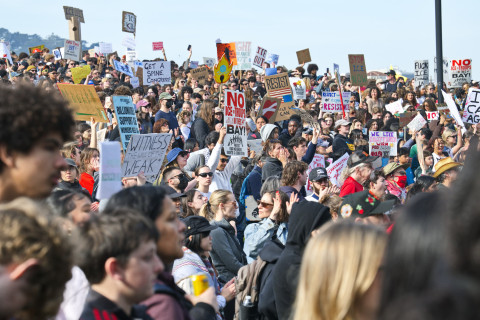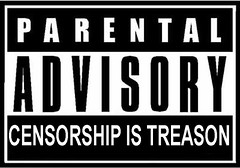Protesters defy Belarus's Lukashenko over poll
Andrei Makhovsky
Reuters (via ABC NEWS)
Mar 21, 2006
MINSK [MAP] - Hundreds of protesters defied Belarussian President Alexander Lukashenko for a third day on Tuesday, massing in the capital to protest over his re-election, denounced as flawed by Washington and independent observers...
...At least 500 protesters, most of them young people, rallied to Milinkevich's call for fresh elections and camped in tents on October Square overnight in an action reminiscent of the highly-organized 2004 "Orange Revolution" in Ukraine......"I came here to support these young people. In previous years I was marching under the red flags and I think it was wrong. That's why I am here. I want my grandchildren to be proud of me," 66-year-old pensioner Pavel Rusetsky said...
- READ FULL ARTICLE HERE -
REVISED: 1 PM ET
Having covered my fair share of protests, I realized a long time ago that the vast majority of demonstrations in this country end up being utter failures.
Sure, there's the momentary exposure, the quick sidebar item that may or may not make the wire reports. There's the flash-in-the-pan 40-second canned package that may make a news broadcast.
But, in the end, nobody cares what your average protester in the West has to say. Your average American "social activist" lives their daily life in relative comfort, brings more self-righteousness to the table than actual righteousness, and usually has more concern for things like theory than practicality.
Unlike people in places like Belarus - where not protesting means more years under a brutal regime - Joe and American Protester often serve as nothing more than well-intentioned noise in the background. The majority of protesters here have the luxury of advocating for change without really accepting the responsibility that comes with being a stakeholder.
Without the willingness to demonstrate true sacrifice - the risk of life and luxury, the possible loss of social and economic status - most protests in the West get written off as being nothing more than an organized complaint.
I once covered a protest against a retail clothing chain in California. A group of college students decided to picket the chain for selling clothes manufactured in sweatshops.
The first thing I noticed was that nearly every protester was wearing clothing sold at a rival clothing boutique, one that also had been accused of relying on sweatshop labor to manufacture its clothes.
Strike One.
The second thing I noticed, in interviewing the group's organizers, was that they had bitten off more than they could chew.
Not a single one of the protesters had ever visited a sweat shop or even knew somebody from a developing nation where sweatshops actually exist. When I asked questions about the plight of the people actually involved, it became equally clear that none of the protesters could identify places like Indonesia or Thailand on a map.
They did have a few nice talking points - pulled from a pamphlet somebody had picked up at a similar rally in San Francisco. Talking points, but no substance.
Strike Two.
I asked one of the protesters the generic opening question: What do you hope to accomplish? Again, I was given a talking point instead of an answer. So I asked a tough question: What's your stake in all of this? The only answer I received, in attempting to interview about a dozen college students, was different variations of how much they cared, how wrong child labor is, how they wanted to raise awareness...
Strike Three.
Caring about some issue doesn't make it newsworthy. I care about whether or not it's going to rain on my days' off - but nobody else really gives a shit. Saying that you are trying to raise awareness conveys no message other than I am not a stakeholder.
Their protest didn't make my station's newscast. They did, however, get a tiny write-up buried in the local newspaper - right next to the Rotary Club's annual pancake breakfast coverage.
I've seen antiwar, anti-Bush, fair trade, and labor protests fall into the same trap. Opinions, as the old saying goes, are like assholes - everyone has one. But for the select few, causes have an actual value attached, beyond the rhetoric.
Take the War in Iraq, for example. There are mothers and fathers all over the U.S. who have buried their children, husbands and wives caring for wounded lovers, soldiers returning from the frontlines with horror stories and tales of valor. Some support the war, some despise it, but all of their opinions matter more to the public than a thousand by those who have risked nothing.
A few months ago, I talked with a single mother, who's only son had just been visited by military recruiters. She was proud that he had decided to serve his country - but downright terrified that how she votes at home might cost him his life.
She's now a stakeholder.
Stakeholders matter. Lip service does not.
TECHNORATI TAGS:
Activism, Belarus, Commentary, Democracy, Elections, Iraq War, Media, Minsk, News Coverage, Politics, Protests, Society, Talking Points, United States














4 comments:
I agree mostly. I think its great to get the word out about causes, but yeah most of the time people aren't doing it because they have a stake in something.
Lol...don't know what version of the post you were reading (I found some edits that I hadn't saved this morning)...hopefully afternoon...
SN:
It is great to get the word out about issues, definitely. But at times that's all that seems to be going on these days. In the Ukraine, you've got the Orange Revolution, in Nepal they're fighting...
And here, you've got anti-war protests where celebs show up for a frigging photo op. It's almost like a ceremony...Martin Sheen shows up, quotes some famous peacemaker, everybody holds hands...and the two minutes are up.
okay i'm confused. are u a liberal or a conservative? what kind of librarian are you anyway?
Cowgirl:
Sadly, it's too true. There's this big misconception - fed at least in part by those who seek to overglorify the rank-and-file anti-Vietnam movement of the 1960s - that mass protests, the ridicule of public officials, the cause celebe somehow matters in the long run.
Sure, the intensity of those protests did keep Vietnam in the forefront, but they really didn't change the course of anything. It wasn't the Jane Fondas or a bunch of college students picketing that "won" the withdrawl from the mistake that was Vietnam.
It was people like Walter Cronkite who changed America's policy on Vietnam. Cronkite, after the Tet Offensive, came back from covering the war, interviewing the soldiers, and witnessing the carnage, and delivered a commentary that did more to bring about an end to that conflict than almost anything else.
It was the American public being made aware of the My Lai Massacre - thanks to a handful of American GIs who refused to put duty to a policy ahead of their duty to the American people. Warrant Officer Hugh Thompson and the helicopter crews during that engagement, who risked their lives by turning their guns on their comrades to end the carnage, saved more children that day than any idiot back in the States screaming "babykillers" from the relative safety of a campus protest.
Amanda:
I'm neither. I think for myself. As for what kind of librarian I am, well, I'd like to think I'm a good one ;)
Post a Comment